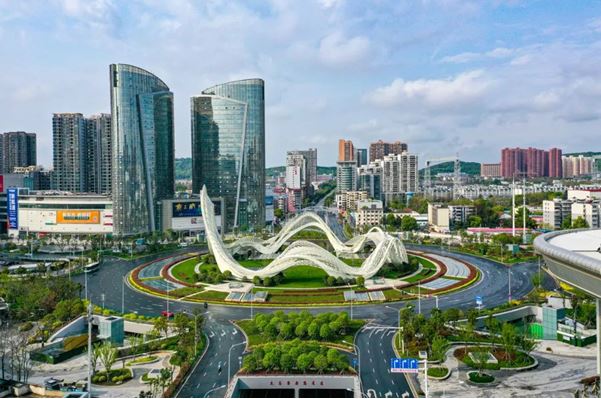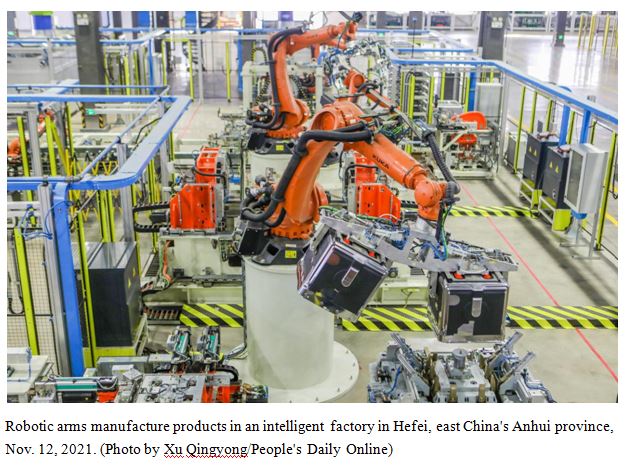Digital industrial clusters prosper in China
 By Wang Zheng, People’s Daily
The rapid development of the digital economy over the recent years in China has led to a tide of the construction of digital industrial clusters.
A batch of digital industrial clusters with international competitiveness has taken shape and grown strong across China, injecting fresh impetus into the high-quality development of the Chinese economy.
Digital industrial clusters, led by new development philosophy, include enterprises and relevant organizations driven by digital factors and engaged in digital product manufacturing, digital services, and digital technology application. They have strong core competitiveness.
According to China’s 14th Five-Year Plan (2021-2025) on the development of the digital economy, the country aims to raise the proportion of the added value of core digital economy industries in its GDP to 10 percent in 2025, up from 7.8 percent in 2020.
The China Center for Information Industry Development (CCID) said over 60 percent of China’s 25 advanced manufacturing clusters are engaged in the digital economy. The prospering development of the digital economy is driving the upgrade of industrial clusters.
China Speech Valley, an industrial base focusing on speech recognition technologies in Hefei, east China’s Anhui province, reported revenue of 137.8 billion yuan ($19.71 billion) from its main businesses last year. Led by leading artificial intelligence and speech technology company iFLYTEK, the industrial base is home to 1,423 enterprises. The annual average growths in its output value and number of enterprises have both exceeded 30 percent over the past five years.
A digital security industrial cluster in Hangzhou, east China’s Zhejiang province, is home to leading Chinese video surveillance product and solution provider Dahua Technology, top-notch manufacturer and supplier of video surveillance equipment Hikvision, as well as over 4,300 other innovative enterprises engaged in the industry. The revenue of core businesses of the cluster reached 272.08 billion yuan ($38.9 billion) last year, up 17.2 percent year on year. It has the world’s largest two producers of digital video recorders and cameras, with a market share of over 50 percent.
Represented by global leading provider of optical products Yangtze Optical Fibre and Cable Joint Stock Limited Company and laser technology developer Huagong Tech, the Optics Valley in Wuhan, central China’s Hubei province, has received total investment exceeding 200 billion yuan during the past three years and owns more than 15,000 optoelectronic enterprises. The industrial cluster has witnessed a series of breakthroughs, such as the making of the world’s first 128-layer 3D NAND flash memory chip and China’s first 400G silicon photonics optical module.
Platform-based synergetic online development and production is one of the features of digital industrial clusters. For instance, Chinese tech firm Xiaomi, establishing over 100 enterprises in its ecological chain in the Beijing-Tianjin-Hebei region, Yangtze River Delta and Pearl River Delta, has created more than 100 hot-selling products. So far, the Chinese company has gathered over 4,000 online development teams on its platform.
The new model of work division is another feature of digital industrial clusters. Gao Yingmai, director of the Digital Economy Strategy Research Office of CCID, told People’s Daily that different from the models of one-to-one division adopted by traditional industrial clusters, digital industrial clusters use platforms to connect businesses.
Data alignment and interaction as well as artificial intelligence-enabled analysis make industrial collaboration more precise and efficient, Gao explained.
For instance, these platforms could detect shortages of key spare parts and then seek suppliers, and could also predict fluctuations in the market and thus ensure a reasonable inventory and timely production, Gao noted.
Digital industrial clusters can achieve synergy in R&D, orders, production, quality, inventory and services, said Fan Qiuci, an expert with the AliResearch, a research arm of Alibaba Group. Fan said the clusters can digitalize and align various systems for a closed synergy loop, so as to stabilize and strengthen industrial and supply chains,
An official with the Ministry of Industry and Information Technology said that China will strengthen digital industrialization, industrial digitalization and its data-to-value capability, so as to build digital industrial clusters with international competitiveness in different fields in a phased manner.
According to the official, the country will accelerate the development of industrial clusters, with market potential and dominated by innovative players. China will also build a development pattern led by major enterprises, followed by small- and medium-sized enterprises and constantly joined by innovative companies, to continuously integrate the digital economy with the real economy and traditional industries.
Besides, China will also speed up its efforts to build a national big data center and actively explore the new models of data flow and transaction, to fully turn digital dividends into development potential, the official added.
By Wang Zheng, People’s Daily
The rapid development of the digital economy over the recent years in China has led to a tide of the construction of digital industrial clusters.
A batch of digital industrial clusters with international competitiveness has taken shape and grown strong across China, injecting fresh impetus into the high-quality development of the Chinese economy.
Digital industrial clusters, led by new development philosophy, include enterprises and relevant organizations driven by digital factors and engaged in digital product manufacturing, digital services, and digital technology application. They have strong core competitiveness.
According to China’s 14th Five-Year Plan (2021-2025) on the development of the digital economy, the country aims to raise the proportion of the added value of core digital economy industries in its GDP to 10 percent in 2025, up from 7.8 percent in 2020.
The China Center for Information Industry Development (CCID) said over 60 percent of China’s 25 advanced manufacturing clusters are engaged in the digital economy. The prospering development of the digital economy is driving the upgrade of industrial clusters.
China Speech Valley, an industrial base focusing on speech recognition technologies in Hefei, east China’s Anhui province, reported revenue of 137.8 billion yuan ($19.71 billion) from its main businesses last year. Led by leading artificial intelligence and speech technology company iFLYTEK, the industrial base is home to 1,423 enterprises. The annual average growths in its output value and number of enterprises have both exceeded 30 percent over the past five years.
A digital security industrial cluster in Hangzhou, east China’s Zhejiang province, is home to leading Chinese video surveillance product and solution provider Dahua Technology, top-notch manufacturer and supplier of video surveillance equipment Hikvision, as well as over 4,300 other innovative enterprises engaged in the industry. The revenue of core businesses of the cluster reached 272.08 billion yuan ($38.9 billion) last year, up 17.2 percent year on year. It has the world’s largest two producers of digital video recorders and cameras, with a market share of over 50 percent.
Represented by global leading provider of optical products Yangtze Optical Fibre and Cable Joint Stock Limited Company and laser technology developer Huagong Tech, the Optics Valley in Wuhan, central China’s Hubei province, has received total investment exceeding 200 billion yuan during the past three years and owns more than 15,000 optoelectronic enterprises. The industrial cluster has witnessed a series of breakthroughs, such as the making of the world’s first 128-layer 3D NAND flash memory chip and China’s first 400G silicon photonics optical module.
Platform-based synergetic online development and production is one of the features of digital industrial clusters. For instance, Chinese tech firm Xiaomi, establishing over 100 enterprises in its ecological chain in the Beijing-Tianjin-Hebei region, Yangtze River Delta and Pearl River Delta, has created more than 100 hot-selling products. So far, the Chinese company has gathered over 4,000 online development teams on its platform.
The new model of work division is another feature of digital industrial clusters. Gao Yingmai, director of the Digital Economy Strategy Research Office of CCID, told People’s Daily that different from the models of one-to-one division adopted by traditional industrial clusters, digital industrial clusters use platforms to connect businesses.
Data alignment and interaction as well as artificial intelligence-enabled analysis make industrial collaboration more precise and efficient, Gao explained.
For instance, these platforms could detect shortages of key spare parts and then seek suppliers, and could also predict fluctuations in the market and thus ensure a reasonable inventory and timely production, Gao noted.
Digital industrial clusters can achieve synergy in R&D, orders, production, quality, inventory and services, said Fan Qiuci, an expert with the AliResearch, a research arm of Alibaba Group. Fan said the clusters can digitalize and align various systems for a closed synergy loop, so as to stabilize and strengthen industrial and supply chains,
An official with the Ministry of Industry and Information Technology said that China will strengthen digital industrialization, industrial digitalization and its data-to-value capability, so as to build digital industrial clusters with international competitiveness in different fields in a phased manner.
According to the official, the country will accelerate the development of industrial clusters, with market potential and dominated by innovative players. China will also build a development pattern led by major enterprises, followed by small- and medium-sized enterprises and constantly joined by innovative companies, to continuously integrate the digital economy with the real economy and traditional industries.
Besides, China will also speed up its efforts to build a national big data center and actively explore the new models of data flow and transaction, to fully turn digital dividends into development potential, the official added.


« Palestinians say FIFA World Cup proves their cause not ‘buried’ (Previous News)
(Next News) New professions give a boost to employment »
Related News

China wants ‘new level’ in Germany ties, Beijing’s FM tells Merz
MUNICH, FEB 15: China’s top diplomat Wang Yi told German Chancellor Friedrich Merz that BeijingRead More

China condemns Islamabad imambargah attack, pledges support for Pakistan
BEIJING: China on Sunday condemned an attack on a mosque in Islamabad, pledging support forRead More


Comments are Closed